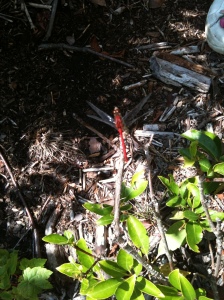
Amelia, my niece was overhead saying to her brother and sister as they looked out the front door facing the expansive gardens and lawn, “It’s a dragonfly forest.” There were hundreds of dragonflies dive bombing mosquitoes and it did look like a dragonfly habitat. We often see them by the masses at sunset around the pool area when we have our dinner out at the picnic table. Honestly, there are no mosquitoes because of the dragonfly patrol. No need to spray here. I did get a photo of the red or rust yellow-legged meadowhawk (Sympetrum olcinum). We saw a twelve-spotted skimmer (Libfellua pulchella). The skimmer has a white abdomen and several spaces on the wings that are clear, with darker accented markings. It is rather large and noticeable.
Looking in a field guide for vernal ponds, I learned that the eastern box turtle is of special concern in Massachusetts. I feel fortunate to have a shell that my dog Tia and I discovered near the pond that was on the back side of our property in Lusby, MD. In December 2000, I carried the shell with me when I moved to Wisconsin. Once I was there, I learned that the turtle was a significant part of Ojibwa culture in the Great Lakes region. There is no such thing as coincidence, seeing as I had moved to Indian Country and would be studying with the Ojibwa at Lac Courte Oreilles Ojibwa Community College (LCOOCC). I graduated from LCOOCC in 2003. You can read about my journey to the Midwest online at http://www.tribalcollegejournal.org/archives/8298
I was granted a Creative Writing Award from Tribal College Journal where the article was published along with other tribal college authors. I am thrilled that the prestigious Journal published the issue online for prosperity.

Continuing our woodland walk, Amelia and I saw many frogs. I saw a wood frog that wears a black mask across its eyes and has a yellow line that distinguishes this particular frog species. Frogs were not all we saw. There was cucumber root . My sister Ronnie told me what it was. Here is a photo of the plant. The upper set of leaves were growing through the beautiful ferns that exist within the woodlands.

The plant is unique because it as two separate sets of leave with berries within the top array of leaves that form a circle around the plant stalk. Ronnie also pointed out running cedar that grows near the far boundary of the property near the frog pond. . I have to jog my memory re: medicinal plants and look up both running cedar and princess pine. Something is nagging me about one of them being a medicinal plant.
On the walk down Ashby West Road yesterday, I came across lady slipper leaves visibly growing near one of my favorite grandfather boulders. I was really taken aback. There are at least eight sets of visible plants growing along the side of the road. I drove down the hill yesterday and Ronnie was able to be my eyes as we passed the large glacier boulder. Ronnie, being a plant expert herself, was able to spot the lady slippers. I love them because they are part of the orchid family and hardy enough to grow in our northern climate.






